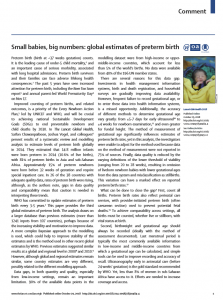
Preterm birth (birth at <37 weeks gestation) counts. It is the leading cause of under-5 child mortality, and an important cause of serious morbidity, associated with long hospital admissions. Preterm birth survivors and their families can face adverse lifelong health consequences. The past 5 years have seen increased attention for preterm birth, including the Born Too Soon report and annual parent-led World Prematurity Day on Nov 17.
Improved counting of preterm births, and related outcomes, is a priority of the Every Newborn Action Plan, led by UNICEF and WHO, and will be crucial to achieving national Sustainable Development Goals (SDGs) to end preventable newborn and child deaths by 2030. In The Lancet Global Health, Saifon Chawanpaiboon, Joshua Vogel, and colleagues present results of a systematic review and modelling analysis to estimate levels of preterm birth globally in 2014. They estimated that 14·8 million infants were born preterm in 2014 (10·6% of live births), with 81% of preterm births in Asia and sub-Saharan Africa. Approximately 15% of preterm newborns were born before 32 weeks of gestation and require special inpatient care. In 26 of the 38 countries with adequate quality data, rates of preterm birth were rising, although, as the authors note, gaps in data quality and comparability mean that caution is needed in interpreting these trends.